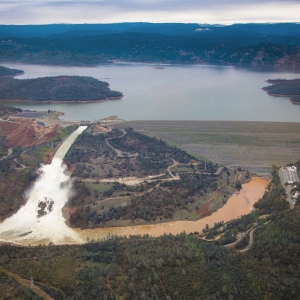The Stream, May 29, 2020: Major Cyber Attack on Israeli Water Systems Thwarted Last Month, Official Confirms
The Global Rundown
Israel’s national cyber chief confirms that a large cyber attack on the country’s water systems was blocked last month. Testing of wildlife at Michigan’s Wurtsmith Air Force base shows the extent of PFAS contamination in the area. Low water levels in Argentina’s Parana River are expected to disrupt grain exports through at least September. Improving water supply in developing nations could be a key way to minimize global plastic pollution, a new paper argues. Massive amounts of manure from feedlots in Minnesota threaten the state’s waterways, a new study warns. Flint, Michigan, puts a temporary hold on a water service line replacement until the Covid-19 emergency is lifted.
“The (city) remains eager to finish this project while also taking all necessary safety precautions according to the governor’s executive orders. We have completed 85 percent of this project and had been poised to finish by June before COVID-19 shutdown services statewide.” — A statement by Flint Mayor Sheldon Neeley in reference to the city’s service line replacement program, which was disrupted by the Covid-19 pandemic. State and city officials, as well as a handful of civil liberties groups, have agreed to pause work on the program until the current state of emergency ends. Once the emergency is lifted, the parties will meet within 10 days to discuss a timeline for the remaining service line replacements. MLive
Latest WaterNews from Circle of Blue
Utilities in Developing Countries, in Financial Tailspin, Try to Keep Water Flowing During Pandemic and Beyond — Water utilities are experiencing a ‘double hit’ in their finances that could hinder operations into the future.
Country’s Aging Dams, a ‘Sitting Duck,’ Facing a Barrage of Hazards — Repairing all the country’s deficient dams could cost $70 billion. Having them fail would come with a far greater price, experts say.
By The Numbers
80 million Number of pigs, cows, and poultry held in feedlots in Minnesota. A new report released by the Environmental Working Group (EWG) warns that the massive number of concentrated animal feeding operations (CAFOs) in the state is imperiling Minnesota’s waterways. The vast amount of manure, as well as widespread commercial fertilizer use, is overloading the environment with nitrate and phosphorus, which is leaching into both surface and groundwater, according to the report. The Guardian
In context: EPA Turns Away from CAFO Water Pollution.
0.82 meters (2.7 feet) Current water level in Agrentina’s Parana River, compared to a normal May median of 3.68 meters (12.1 feet). The minimal water levels have been disrupting the country’s grain exports for months, and delays are likely to persist until at least September, officials warn. Reuters
Science, Studies, and Reports
A new “blue paper” by a group of international researchers argues that improving water infrastructure in developing nations may be a key way to cut down on global plastic pollution. People living in developing nations use billions of plastic water bottles each year due to poor tap water access. The consumption of plastic water bottles could be mitigated by building safe, reliable water infrastructure, according to the paper’s authors. The Guardian
On the Radar
Israeli national cyber chief Yigal Unna officially announced on Thursday that the country thwarted a major cyber attack launched against its water systems last month. The attack has been widely attributed to Iran, although Unna did not cite the country directly, and instead issued a warning about the growing trend toward covert cyber warfare. Associated Press
In context: Water Sector Prepares For Cyberattacks.
Last year, Michigan state officials introduced stricter regulations on hunting and fishing near the Wurtsmith Air Force Base after high levels of PFAS were found in nearly every animal and aquatic species tested nearby. Elevated amounts of PFAS were detected in algae, snails, tadpoles, dragonflies, crayfish and various small fish, demonstrating the extent of the contamination left by the use of PFAS-laced firefighting foam at the airbase. Detroit Free Press
In context: Michigan’s Groundwater Emergency.
Kayla Ritter is a recent graduate of Michigan State University, where she studied International Relations and Teaching English to Speakers of Other Languages. She is currently based in Manton, Michigan. Kayla enjoys running, writing, and traveling. Contact Kayla Ritter





Leave a Reply
Want to join the discussion?Feel free to contribute!